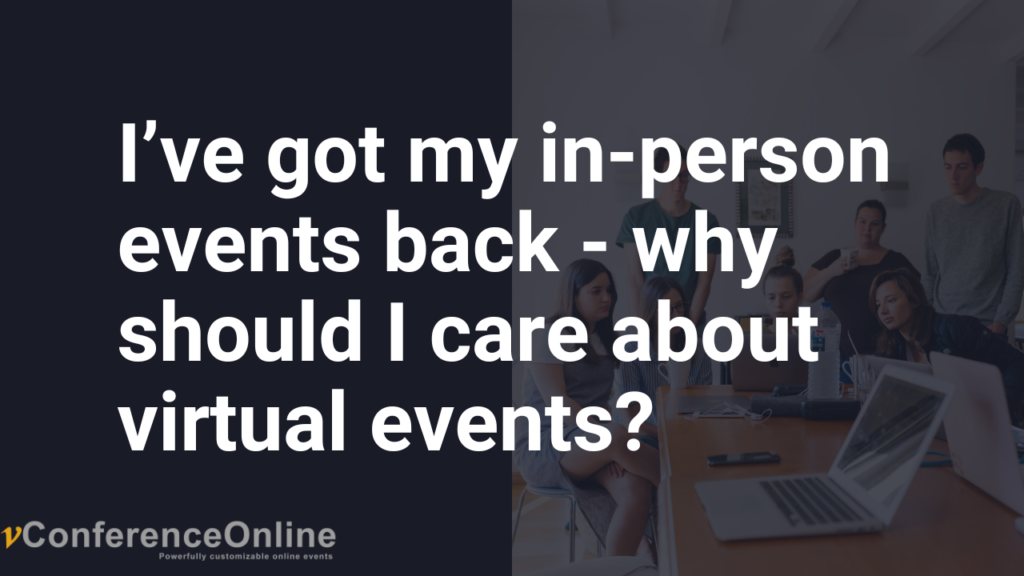I've got my in-person events back - why should I care about virtual events?

The event world is celebrating the return to in-person events. Two long years have gone by, and your events can finally be in person with the lifting of masking mandates and travel restrictions. But, if you’ve gone to restart your in-person events lately, you’ve noticed that things are different in a post-Covid world. The phrase “new normal” has been thrown around often, and it’s not always accurate. The world is in flux, with inflation, rising interest rates, economic uncertainty, staffing shortages, and more. This isn’t 2019, but most event organizers are racing back to their same 2019 strategy.
It’s a short-sighted move that misses some of the nuances of today’s audiences.
This post is not about how virtual events are vastly superior to in-person events. The people shouting that from the rooftop are equally shortsighted. They often are in the event tech space, dealing with significant staffing cuts, and are struggling to remain relevant as in-person events have surged nearly back to pre-Covid levels.
This is a post about the place that virtual events should take in your overall event strategy. Read on for a nuanced look at in-person and virtual events.
In-Person Events: The Good and the Ugly
In-person events are crucial for many companies and organizations. They have unmatched features and benefits, which is why they have been a go-to for decades for different associations.

Here are some of the top benefits of your in-person events:
- There are few things as effective at creating community as an in-person event. The shared experiences are critical to creating long-lasting connections and relationships. Influence&Co note that in-person events are such effective content marketing tactics because they offer the chance for human connection.
- Many virtual platforms have attempted AI/ML-assisted networking, but nothing will beat networking at an in-person event. Attendees are 21% more likely to accept 1:1 meetings at in-person events than virtual events, and other attendees accept 2 in 5 meeting requests at in-person events. These numbers are crucial to sponsors and industry networking, and no virtual event platform has these numbers.
- In-person events allow you to generate energy and excitement around your brand. You can use this to maximize your marketing efforts to grow your thought leadership, branding awareness, and more!
Unfortunately, in-person events are not all sunshine and rainbows, and there have been some significant struggles as events have come back in person.
- Horror stories about labor shortages have been abundant as in-person venues struggle to find and retain qualified staff to keep up with the surge in events. Event organizers must also relearn how to work with unions in events, including additional budget and time constraints.
- Empty exhibit floors and low attendance stories have been abundant. Skift Meetings, formerly EventMB, notes that attendance numbers are 37.9% below 2019. When events are looked to as a significant source of leads, this decrease in attendance will dramatically impact sponsorship packages and event revenue.
- In-person events are not driving the revenue that is expected. These events have become a liability and expense rather than a revenue source. We’ve heard anecdotes of organizations hosting exclusively in-person events that have lost upwards of $600,000 to $900,000 in one event. Anything that bleeds money like that cannot be seen as a revenue source but as an expense that must provide some other benefit to be justified.
In short, if your event strategy is about creating community and human connection and is driven by energy and excitement, your in-person events may be worth it despite labor shortages, low attendance, and the expense incurred.
Virtual Events – Flexibility for your attendees, speakers, and sponsors
In a post-Covid world, people worldwide are looking for flexibility. Working remotely has become the new normal, with people spreading far out from the main headquarters of a company to find a lifestyle that matches their desires. The rise of streaming services, food delivery services, and grocery delivery services show that people everywhere are looking for convenience and are often willing to pay a premium for it!

In that same vein, virtual events can provide your attendees, speakers, and sponsors unparalleled flexibility and convenience. Here are some of the most popular options that allow that flexibility:
- Attendees can access crucial training and continuing education whenever is best for them! With families working from home, children, spouses, and other roommates may make it difficult to concentrate during specific hours. Allowing attendees to access these features anytime will enable them to stay in compliance while optimizing their schedules.
- Sponsors have increased reach via their booth during the live event and the On Demand period of your event. Having an exponentially longer time to access attendees will increase their qualified leads and help justify (and even increase) the price of their sponsorship package.
- Speakers can use whatever tools they are most comfortable with! They can choose to live stream, pre-record, or use a breakout tool to present their content in whatever format they would like.
If you are holding a hybrid event, it’s important to note that your virtual participants must not be treated as second-tier attendees. Virtual participants must have the same engagement and impact on the event’s outcomes as your in-person attendees. This new way of looking at your hybrid events, called hybrid equity by Leading Edge Training Solutions’ Lee Deaner, will likely mean an increase in costs, planning, and preparation. However, the benefits are enormous. Read more about hybrid equity here.
Virtual Events – Future-proofing your event strategy
The world is constantly changing, and the event industry is no different, nor is it exempt from impact from outside industries. From mental health crises among event organizers stemming from pandemic responses and rapid changes to significant concerns over host destination cities with rampant violence, it’s clear that outside influences can have substantial effects on your event strategy.
Lessons can and should be learned from industries that did not make adjustments quickly. Changing with the times, providing value, and measuring success are critical components to keeping pace with rapid changes. Even with that, unexpected changes can, and will, hit the event industry quickly, and you will need some way to future-proof your event strategy.

Virtual events can be hosted and viewed from anywhere in the world, allowing you to meet your attendees where they are. By removing the need to travel, you can help recession-proof your event strategy by lowering the cost of attendance for attendees, making them much more likely to attend your event. This will also help to offset the risk for your sponsors, especially when exhibition revenues dropped by 15% in the 2008 recession.
Virtual Events – Revenue drivers
While in-person events have started belonging more in your company’s expense column than the revenue column, your company must look for other ways to increase your revenue. Despite common myths about virtual events, virtual conferences effectively lend themselves to monetization.

Here are a few options for monetizing your virtual events:
- You should be charging for tickets. With options like ticket types to create differentiated experiences for your attendees, you can provide budget-friendly options to allow for a wider audience. You can also offer add-ons such as paid speaker breakouts and on-demand access to provide the possibilities that your attendees are looking for while increasing your organization’s event revenue.
- Much like your in-person events can be subsidized by your sponsorships, you can also offset your virtual event cost using sponsorship packages. With video advertisements, networking lounges, booth locations, and logo placements in email blasts, your sponsors will still be able to get the qualified leads they need to justify sponsoring your virtual conference.
- Virtual conferences allow access to attendees worldwide, which means you have a dramatically increased audience. Take advantage of this increased reach to market your event in different ways and consider how you can engage those attendees year-round. Not only will this increase your revenue for this event, but it will also make your other marketing efforts more effective.
Virtual events have an opportunity to have massive ROI. A $200,000 net profit on a virtual event is better for your organization than a $2,000,000 gross revenue on your in-person event when there were $3,500,000 in expenses.
Don’t confuse gross revenue for net profit in your rush back to your comfort zone of in-person events. That’s a fast way to end up on the outside looking in at your organization pivoting and making changes without you.
Don’t let that happen to you. With the right platform, you can work on driving the marketing, finding top-quality speakers, and building out your winning event strategy while the platform can build your virtual conference for you. These Fully Managed Experiences effectively bring on an entire team of platform experts at a fraction of an FTE cost.
Your platform doesn’t have a Fully Managed Experience? Why are you still using a platform that can’t provide you with that level of support? At vConferenceOnline, we specialize in that level of support. Click below to schedule a demo today to see how we can help create an incredible virtual conference for your organization while increasing your virtual event revenue.
Before you go – we are giving you one free Fully Managed event with any annual agreement, but only through the end of July. Click below to schedule a demo to see vConferenceOnline in action, and put “Wifflesnargits” in your note section to get your free Fully Managed event. We’ll be your support for your event and allow you to focus on other ways that you can be irreplaceable for your organization.
Attendees Best Practices Booths Branding Case Study Certifications Chat Content Continuing Education Corporate Credit Card Customization Education Encryption Engagement event strategy Exhibitors Friday Feature GDPR Hybrid job fairs Lead Gen Marketing Microsite monetizing myths Networking On Demand Polls Pre Recorded Privacy Quizzes Reporting Revenue Security Setup Help Simulated Live Speakers Sponsors Streaming Support Tracks Training Webcasts Webinar